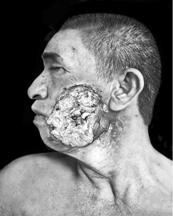Courting death to stay awake
Chewing betel may keep the bus drivers and conductors
alert but it also makes them prime candidates for oral cancer :
by Carol Aloysius
A sharp rise in oral cancer in Sri Lanka has prompted health
authorities to reiterate its warning on betel chewing, which is directly
linked to the spread of oral cancer. However, recent news reports
claiming it affected bus drivers and conductors more than any other
groups have met with mixed reactions.
 "Betel
chew has over 30 carcinogenic substances. Areca nut has four and the
tobacco leaf the balance. There is evidence to prove this," Director,
Cancer Control Campaign, Dr Eshani Fernando told the Sunday Observer. "Betel
chew has over 30 carcinogenic substances. Areca nut has four and the
tobacco leaf the balance. There is evidence to prove this," Director,
Cancer Control Campaign, Dr Eshani Fernando told the Sunday Observer.
Citing statistics, she said data collected in 2008 had revealed there
were 2,107 new cases of oral cancer, the majority of which were caused
by betel chewing, smoking and other factors. She said 2 to 3 persons die
of oral cancer in Sri Lanka every day and that the survival rate after
five years of oral cancer was around 50 percent.
Dr. Fernando however refuted recent news reports claiming that oral
cancer affected largely bus conductors and bus drivers in Sri Lanka.
"There are no such studies to prove this," she said, insisting that
there were no reports to show a particular group being affected by oral
cancer more than others. But she admitted that it was a fact that oral
cancer is commonest among those who chewed betel . "Any person whatever
his occupation may be could get oral cancer if he chews betel as a habit
daily," she said.
She further said that while the incidence of oral cancer caused by
tobacco smoking had come down due to more awareness raising through
social media, the same could not be said about oral cancer from tobacco
chewing (betel chewing).
"We are concerned that the habit of betel chewing is now spreading
among young persons, including school children, who according to our
information, are now increasingly purchasing arecanut in packet form
e.g. babul. Nicotine, which is present in the tobacco leaves have
additive property, while arecanut is a carcinogen," she warned, adding
that those who haven't started this habit should never begin as it is
addictive.
Abstain
It was encouraging to find a few exceptions among these betel chewing
bus drivers and conductors who not only abstained from the habit, but
even took it on themselves to advise their colleagues to stop chewing
betel altogether. .
Delay
So why should a delay to reach their destinations pose such a huge
problem to these drivers?
The following example given on grounds of anonymity explains why.
"Take the run from Fort to Elakanda where the route is divided into
two sections. A bus going on one route (the longer one) has to reach its
destination in 45 minutes. A bus using the shorter route is given just
13 minutes to reach its destination.
A delay of one minute could end up with the conductor and driver
having to fork out Rs 100/- to the owners, no small sum considering that
a conductor gets only 10 percent of the total earnings and the driver 12
percent. Which means having breakfast is out. But we have about 20
minutes for lunch. If we miss that due to a breakdown, our only comfort
is the betel chew."
Who is most at risk?
So are bus
conductors and drivers more vulnerable to oral cancer or
not? Does the nature of their particular occupation force
them into habits like smoking and betel chewing, which puts
their lives on the line? We posed this question to a cross
section of bus conductors and drivers in the Fort. Their
response was not only enlightening but gave new insights as
to why betel chewing is common among this particular breed
of workers.
 Sanjeev
who hails from Tangalle and has been driving buses to
various parts of the country for the past 16 years is a
regular betel chewer. He admits he takes at least three to
four betel chews on a daily basis. "But that is only if I
have to do a long distance run. Chewing betel helps to keep
me awake," he says. He points out driving especially at
night to his final destination on time is not easy,
especially on an empty stomachm with no time for even a
coffee break. So chewing betel is his only means of keeping
him from falling asleep at the wheel. Sanjeev
who hails from Tangalle and has been driving buses to
various parts of the country for the past 16 years is a
regular betel chewer. He admits he takes at least three to
four betel chews on a daily basis. "But that is only if I
have to do a long distance run. Chewing betel helps to keep
me awake," he says. He points out driving especially at
night to his final destination on time is not easy,
especially on an empty stomachm with no time for even a
coffee break. So chewing betel is his only means of keeping
him from falling asleep at the wheel.
Does
he know the health risks of betel chewing? "Certainly. The "saukya
amathyansa dosthara mahaththayas" (health officials) have
regularly discussed this subject with us. But what other
options do we have to keep ourselves from falling asleep,
while racing on the roads to meet our allotted time
schedules?" he asks.
 Ratnayake
on the other hand chews betel for just the opposite reason.
It helps him relax. Ratnayake
on the other hand chews betel for just the opposite reason.
It helps him relax.
"I
have to be at this bus stop by 5.30 a.m. even after a night
of long distance driving. So once I have a quick breakfast,
I have a betel chew to relax me," he says, adding that he
always washes his mouth with a glass of water after his
chew, "to avoid the risk of oral cancer about which we have
been warned by the health officers".
 Thusitha
is a chained betel chewer. At 25 years his otherwise perfect
teeth, which are already badly stained brown, bear evidence
of this fact. "I chew betel at least 3-4 times a day and
sometimes more when I'm under stress," he says. Aside from
his job as a conductor, he believes his farming background,
where it is customary to have a betel chew immediately after
lunch, may have instilled this habit from childhood days.
Knowing the risks however, he says he is determined to kick
the habit. "I know I can. I don't want to end up with oral
cancer," he says. Thusitha
is a chained betel chewer. At 25 years his otherwise perfect
teeth, which are already badly stained brown, bear evidence
of this fact. "I chew betel at least 3-4 times a day and
sometimes more when I'm under stress," he says. Aside from
his job as a conductor, he believes his farming background,
where it is customary to have a betel chew immediately after
lunch, may have instilled this habit from childhood days.
Knowing the risks however, he says he is determined to kick
the habit. "I know I can. I don't want to end up with oral
cancer," he says.
 Young
Amila Prasanna, a conductor, said he was well aware
of smoking tobacco and chewing betel. "I once worked with a
non governmental organisation which was raising awareness on
the subject. Neither I nor my driver, Priyantha Norshan,
smoke or chew betel. But we do know that many drivers chew
betel to avoid falling asleep at the wheel. Perhaps the
authorities will be able to come up with a good solution in
the near future". Young
Amila Prasanna, a conductor, said he was well aware
of smoking tobacco and chewing betel. "I once worked with a
non governmental organisation which was raising awareness on
the subject. Neither I nor my driver, Priyantha Norshan,
smoke or chew betel. But we do know that many drivers chew
betel to avoid falling asleep at the wheel. Perhaps the
authorities will be able to come up with a good solution in
the near future".
 Timekeeper
Tyronne
who supervised the schedules of the buses on the 107 bus
route from Fort to Elakanda, agrees: "If I see any of my
colleagues chewing betel, I make it a point to discourage
them, by telling them my personal experience of how a close
friend of mine, a skilled mason had been reduced to a mere
skeleton unable to eat or drink due to oral cancer, which he
got as a result of sleeping the entire night with a wad of
betel chew in his mouth," he says. Timekeeper
Tyronne
who supervised the schedules of the buses on the 107 bus
route from Fort to Elakanda, agrees: "If I see any of my
colleagues chewing betel, I make it a point to discourage
them, by telling them my personal experience of how a close
friend of mine, a skilled mason had been reduced to a mere
skeleton unable to eat or drink due to oral cancer, which he
got as a result of sleeping the entire night with a wad of
betel chew in his mouth," he says.
This
was confirmed as a fact by Cancer Control authorities who
admit that the risk of getting oral cancer increases
significantly if the betel chew is kept inside the mouth for
a long period of time. |
|

